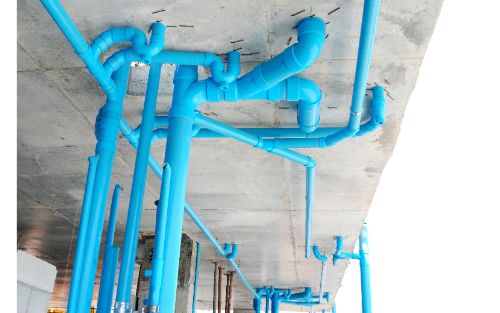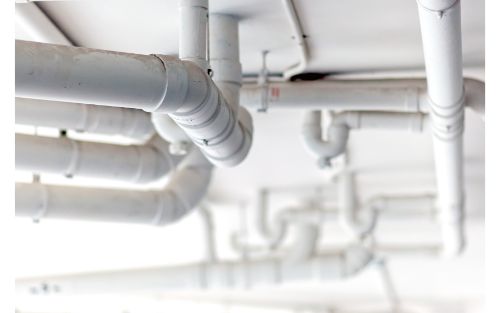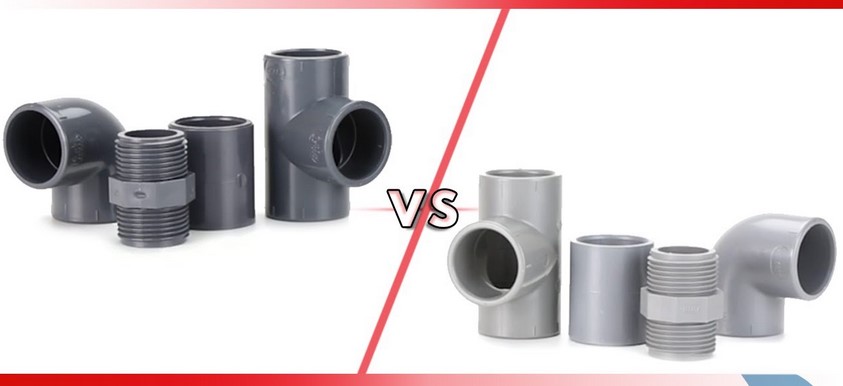ABS and PVC are the most used pipes in the plumbing system of the household. Moreover, both indoor and outdoor plumbing systems might have the presence of pipes due to their high suitability.
Now, what’s the difference between ABS VS PVC pipe? Well, ABS pipe is more suitable for outdoor use whereas PVC is preferable for indoor use. But ABS should not be left in the sun exposure as it would deteriorate the pipe. Whereas installing PVC is a long process as it requires priming first.
Both ABS and PVC have their strength in terms of usage in the plumbing system. For further details on the pipes, the strengths and weaknesses of both pipes are included in the below sections.
Comparison Table: A Quick Look Between ABS And PVC Pipes
Let’s go through the key differences between ABS and PVC pipes.
| Parameter | ABS pipe | PVC pipe |
| Color | Black or Grey | White |
| Strength | Stronger | Less, in comparison to the ABS |
| Resistant | Deteriorates in exposure to sunlight | Comparatively resistant to sunlight unless exposed for longer |
| BPA | Present | Absent |
| Suitable application | Underground, drainage, sewage, vents, outdoor | Plumbing, drainage, and indoor |
| Flexibility | Less | More |
| Prone to breakage | More | Less |
| Deformation | Less deformable | Highly deformable |
| Connection process | One-step process | Two-step process |
| Requirement for bonding | Bonds easily with cement | Requires to be treated with primer first then cement |
| Price | Visit Amazon | Visit Amazon |
A Depth Comparison: ABS Vs PVC Pipe
In the above table, only the key differences between the ABS and PVC pipes are added. To provide a further view, details on each parameter are highlighted in the below section.
1. Color
The color variations in pipes help to locate them in the plumbing system smoothly. The abbreviation of ABS stands for Acrylonitrile butadiene Styrene. It often comes in black and gray colors.
While for PVC, the full form is Polyvinyl chloride. Generally, they come in white. That makes it easily identifiable.
2. Strength
ABS is a terpolymer that is created by the copolymerization of Acrylonitrile and styrene. The component in the ABS is highly attached to a chain. It holds them together in a place and gives the structure strength. Also, it contains bisphenol which is known to harden the plastic material.
On the other hand, PVC is the polymer of vinyl chloride which is also dense and stronger. Though both pipes are stronger, ABS is more durable in comparison to PVC.
3. Resistant
Both the ABS and PVC pipes are corrosion-resistant. But the only difference is ABS can get damaged with time if it is exposed to sunlight. UV light can shrink the pipe and make it deformed. That’s why it’s better for underground applications.
However, it can resist cold temperatures. As a result, it would remain stable even in winter which would facilitate water supply.
However, PVC can stand sunlight but the color would get deteriorated. Also, prolonged exposure to sunlight can lead to the formation of free radicals. If the free radical contaminates the water, it can be hazardous. As the pipes normally do not get exposed to high heat and sunlight, there is less risk of contamination.
4. BPA
BPA refers to bisphenol A. This is used in plastic materials to give them durability. Moreover, it is considered a health hazard. Furthermore, research has shown BPA has a connection to cancer and retards the growth of the cell tissues.
One of the biggest sources of BPA is drinking water. The contamination occurs due to the exposure of pipes to the water. There are also restrictions that the BPA should not be consumed more than 0.2 ng/kg of body weight.
Generally, PVC does not contain any BPA. But ABS is made of BPA which is the reason behind the strength of the pipe.
5. Suitable application
The ABS pipe is suitable for outdoor applications such as sewerage, drainage, and vents. But exposure to sunlight should be prevented to not cause deterioration. The ABS pipe is also stable and durable. Though it gets affected by sunlight, it can also stand cold weather better than PVC. That’s why, ABS is mostly chosen for outdoor plumbing.
While PVC is suitable for indoor use. The pipe is flexible, affordable, and can resist corrosion. Even replacing the pipe is less troublesome in the home. But it requires a two-step process and the right primer and cement.
6. Flexibility
PVC is more flexible than ABS. Flexible pipe is easier to handle while installed in the plumbing system. Well, PVC contains plasticizers which makes it softer. While ABS contains BPA which makes it harden.
7. Prone to breakage
The ABS pipe has more breakage rate than the PVC pipe. Both are durable and strong but ABS is more likely to get cracked since it is brittle. Also, ABS does not require primer to be applied which makes it more prone to breakage. PVC is flexible and does not break easily. Rather you can flex it and deform it.
8. Deformation
ABS is less likely to get deformed in comparison to PVC. ABS is hard and can not be deformed due to its chemical composition. Even though it can crack and break, it would certainly not get deformed by slight pressure. While flexibility is a sign that the PVC pipe would be deformed even with slight pressure, this makes the PVC pipe to be easily handled.
9. Connection process
The connection process in ABS has only one step. It only needs the application of specialized cement. After brushing the specialized cement on the ABS pipe, one can attach one pipe to the other.
Here’s a video that portrays how easy it is;
But in the case of PVC pipe, firstly putting the primer is necessary. Afterward, cement is applied to the pipe. Finally, one can attach two pipes.
This requires a two-step process. Which might seem troublesome to some. But applying primer facilitates the attachment of the pipe and prevents breakage.
10. Requirement for bonding
Well, ABS pipes bind to the cement instantly. That’s why primer is not required here.
But in the case of PVC pipes, the application of primer is a must. Otherwise, the pipes would not attach to the cement due to the lack of adhesion.
11. Price
PVC is the most widely used pipe because of its price. Moreover, it is convenient and affordable.
Contrarily, ABS pipes come at a high price. Especially, the shipping cost adds to the price of the pipe which makes it too costly.
Which Is Better ABS Or PVC Pipe?
Well, both the ABS and PVC pipes are better but for different use and different places.
- Generally, ABS pipe is highly stable to chemical changes and corrosion. Also, it has higher strength and durability. But the problem can appear if it is kept on exposure to sunlight as UV light would lead to the deterioration of the components of the pipe.
- Instead, the pipe can withstand cold temperatures. This makes it clear that ABS is suitable for outdoor usage as long as avoiding sunlight is possible. Mainly, installing the ABS is appropriate on the underground, drainage, and sewerage.
- However, although the pipe is hard, there is also a higher rate of crack on the pipe. That makes it unsuitable for prolonged use. Above all, the price of the pipe makes it expensive for the consumer. Consequently, many people might not prefer it due to the price.
On the other hand, there is PVC pipe which is the most commonly preferred pipe worldwide.
- It can resist both chemical changes and corrosion. However, it is flexible, easy to handle, and comes at a handy price. PVC does not have many disadvantages except for prolonged exposure to high temperatures that would form free radicals.
- As long as the pipe is not in direct sun exposure and high heat, it is safe to use.
In conclusion, PVC and ABS both are good in their states and have different functionality. According to your needs, you can choose the best option. If you want an outdoor fixture that is sturdy, go for ABS. Otherwise, for indoor uses and flexible operations, nothing is better than PVC.
FAQ Section
Let’s check out some common questions regarding ABS vs PVC pipe
Q: Which is better for plumbing: ABS or PVC pipe?
In general, PVC pipes are better suited for cold water systems while ABS pipes are recommended for drain-waste-vent (DWV) systems.
Q: Can ABS and PVC be connected?
Yes, connecting the ABS and PVC pipe is possible but it will require specialized cement. Without the transition cement the pipes would not bond with each other and get loosened.
Q: Can ABS hold boiling water?
Yes, ABS can stand up to 105 degrees Celsius so holding boiling water is quite suitable for ABS pipes.
Final Words
Overall, choosing ABS vs PVC pipe depends on the user and on the operation to perform. Furthermore, as both pipes are worthy for different places, one can easily decide which one to use.
Precisely to say, ABS is further preferable for outdoor exposure while PVC is for indoor. Also, both pipes are fit for long use and safe use. Apart from that, the easy handling and installation process of both pipes makes them consumer preferable. Only the price would vary.

